Cloak of Silence Covered Abuse at Jesuit Retreat
Religious order admits two retarded men were victimized. Talks are underway to settle $10-million suit.
By Glenn F. Bunting
Los Angeles Times
March 24, 2002
{This article was cached from the web version, supplemented by photographs, display type, and a document that appeared in the paper edition. See also Childlike Quality Won Victims Many Friends, by Glenn Bunting, LA Times, March 24, 2002; A Crusader for Justice, by Michelle Guido and Rodney Foo, San Jose Mercury News (April 1, 2002); and Behind a Priest's Suicide, by Glenn F. Bunting , Los Angeles Times (August 6, 2005), about the alleged sexual abuse of Rev. James Chevedden, S.J., by Rev. Edward Thomas Burke, S.J., with a copy of the legal complaint filed in the Chevedden case.}
LOS GATOS, Calif. -- Two mentally disabled men who live and work at a Jesuit retreat were sexually abused by members of the clergy for at least five years, according to court records and interviews.
In a case that drew no public attention, one of the clergymen, Brother Charles Leonard Connor, was convicted last year of committing a lewd act on one victim. He is free after six months of home detention. Another Jesuit, Father Edward Thomas Burke, admitted to his superior two years ago that he engaged in sexual misconduct with the other victim, documents show.
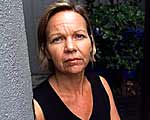 |
| "It's just a terrible, terrible betrayal. This is so horrendous, so evil and so corrupt." -- Debra Sullivan, sister of one of the victims |
Police reports and internal memos reveal a pattern of warnings followed by a reluctance on the part of some Jesuit leaders to notify authorities--much like dozens of other cases of sexual abuse involving Catholic priests that have surfaced around the country.
In addition to Connor, three other Jesuits are registered as sex offenders in Northern California. All three were convicted in separate cases involving minors.
Connor and Burke, both 80, are among four Jesuits named as defendants in a lawsuit charging that the mentally impaired men were subjected to repeated acts of sodomy, molestation and false imprisonment at Sacred Heart Jesuit Center. Attorneys representing the California Province of the Society of Jesus, commonly known as the Jesuits, have been negotiating a monetary settlement with lawyers for the two victims over the past year.
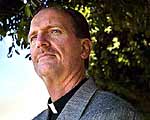 |
| "Clearly, two men did things they shouldn't have done. We are not denying that. I wish this hadn't happened. I want to make sure that it never happens again." -- Father Thomas H. Smolich, head of the California Province |
Father Thomas H. Smolich, head of the California Province, acknowledged that Connor and Burke took advantage of the mentally disabled men. He said allegations that any other members of the Jesuit order sexually abused the victims are unsubstantiated.
"Clearly, two men did things they shouldn't have done. We are not denying that," Smolich said in an interview. "I wish this hadn't happened. I want to make sure that it never happens again."
An attorney for the California Province, Paul E. Gaspari, added: "We're not saying sexual misconduct didn't go on. We're saying we didn't know it was going on."
 |
| Sacred Heart Jesuit Center (Randi Lynn Beach / For The Times) |
However, an acquaintance of the victims alerted Jesuit superiors to possible sexual misconduct at the retreat in 1995. Two years later, Santa Clara County sheriff's deputies visited the Sacred Heart Jesuit Center after a nearby shopkeeper, acting on behalf of the victims, made allegations of molestations.
Jesuit superiors at Sacred Heart relocated Burke in April 2000, after he admitted having sexual contact with one victim, but they did not notify authorities. Connor also was removed, but only after a sheriff's detective threatened to have him arrested. The Jesuit superiors sent Connor to a residence on the campus of the all-boys Bellarmine College Preparatory in San Jose without telling school officials that he was under investigation for sex crimes.
The three other Jesuits who are registered sex offenders also lived at Sacred Heart in Los Gatos. Their offenses did not occur at the facility and did not involve the two mentally disabled men. Two clergymen were convicted in separate felony cases of molesting 7-year-old girls. The third, an associate pastor at Most Holy Trinity parish in San Jose at the time of his arrest, was convicted on two counts of oral copulation with a minor.
Until now, the sex crimes by Jesuits and the abuses alleged in the civil lawsuit have not been disclosed publicly. Unlike many of the cases involving pedophile priests that have been reported in the media recently, the abuses at Sacred Heart occurred in the last few years and the victims are mentally incapacitated adults, who are granted fewer legal protections than minors.
Across the country, the Roman Catholic Church has been grappling with allegations of sexual misconduct by priests and mounting criticism that church leaders have been slow to act. To date, individual dioceses in the U.S. have paid hundreds of millions of dollars to victims of sexual abuse by Catholic clergy.
The Jesuits make up the largest religious order in the Catholic Church. Founded in 1540 by St. Ignatius Loyola, a Basque nobleman, the Jesuits have more than 21,000 members serving 112 nations.
The Jesuit order is divided into 10 provinces in the U.S. Smolich oversees 457 Jesuit members in four Western states and Hawaii. His office is located on the property of Sacred Heart, a picturesque retirement community for about 65 Jesuits overlooking the Santa Clara Valley.
Since he was appointed provincial in 1999, Smolich said, he has made his position on sexual harassment and sex abuse unmistakably clear.
"We don't tolerate it," he said.
Smolich, 47, who reports directly to the Jesuit superior general in Rome, said he believes sexual misconduct is not a problem within the California Province. Aside from the four registered sex offenders, only two cases of sexual abuse with minors appear in province files in the last 15 years, he said. They involved inappropriate touching, Smolich said.
In both cases, the Jesuits received treatment and are active again in ministries, although their contact with children is restricted. Smolich declined to provide names of the offenders or any other details.
Of the seven clergymen convicted of sex crimes or named in the civil lawsuit, five were previously employed at Jesuit high schools. Smolich said he is unaware of any prior complaints of sexual misconduct filed against those clergymen.
Smolich said "mitigating circumstances," such as the advanced ages of the defendants and the diminished mental capacity of the victims, make it difficult to determine the precise nature of the sexual abuse alleged in the lawsuit. "This is hard. It is complicated," Smolich said. "We're never going to know what really happened. We just aren't."
Connor and Burke both cited their 5th Amendment privilege against self-incrimination on numerous occasions during depositions taken recently. They were not made available for comment by the California Province or their attorneys.
The lawsuit, filed June 19, 2001, in Santa Clara County Superior Court, alleges that the two victims were sexually abused for "as long as 30 years." This claim is based on statements by the victims that the molestations began within a year of their arrival at Sacred Heart, said M. Jean Starcevich, the victims' attorney. The plaintiffs are seeking more than $10 million in damages.
The two victims at Sacred Heart are referred in court documents as "John Doe" and "James Doe."
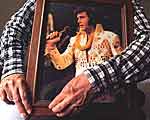 |
| Victim and his idol (Robert Durell / LAT) |
John, 56, was born in San Francisco and contracted polio as a child. He was raised in foster homes, attended Polytechnic High School in San Francisco in the early 1960s, and moved to Sacred Heart on Oct. 8, 1969, at the age of 24.
He has one leg substantially smaller and shorter than the other, suffers severe back pain as well as arthritis in the hands and recently underwent a hernia operation. He is a huge Elvis Presley fan and spends time hand-painting medals to pin on his military shirts.
 |
| Hands of a victim (Robert Durell / LAT) |
James, 50, was born in Germany and adopted from an orphanage as a toddler by a U.S. Air Force officer and his wife. His parents were divorced when he was 10. He never attended school and spent his teenage years in a state mental institution. He arrived at Sacred Heart on Aug. 26, 1970, at the age of 19.
He is a railroad buff who enjoys viewing tapes from his collection of more than 100 train videos. Whenever possible, James will spend hours at a railroad station watching trains arrive and depart.
Both men have been diagnosed as suffering from mental retardation. At Sacred Heart, they were employed as dishwashers responsible for cleaning, drying and storing pots and pans used in preparing meals for the Jesuits. They were paid a starting salary of $150 per month.
"The purpose of them being here was charitable," said Gaspari, the Jesuits' attorney.
Before they were placed on paid administrative leave a year ago, John and James earned about $1,000 per month with expenses deducted for room and board. They still occupy adjacent rooms on the second floor of a storage facility, which is separate from the Jesuit residence. The sexual abuse took place in the victims' rooms, according to statements they made to a psychiatrist.
Victim's Acquaintance Reported Abuse
The following accounts are drawn from criminal and civil filings, transcripts of confidential depositions, police reports and internal Jesuit memos. In addition, more than 50 interviews were conducted with prosecutors, investigators, members of the Society of Jesus, lawyers, guardians for the victims and other sources.
The first indications of sexual misconduct were reported to Sacred Heart in May 1995 by John's financial advisor. According to a sheriff's report, she had heard rumors from the kitchen staff that Brother Connor was molesting John. She knew that Connor had taken John on trips and spent considerable time alone with him. When she asked John about the rumors, he "became very upset and began to shake" before saying that Connor had been touching his private parts, according to the report.
 |
| Brother Connor, 1975 |
She reported Connor to Father Greg Aherne, the Jesuit superior at Sacred Heart at the time. Aherne talked to Connor, who initially denied the allegations before admitting that "maybe he had done some inappropriate touching" while giving John massages, Aherne would tell sheriff's detectives years later. Connor later told detectives that he began giving John massages in 1985 to ease his back pains.
Aherne ordered Connor to read the California Province policy on sexual harassment and misconduct, which specifically banned the practice of Jesuits giving or assisting in massages "because of the liability involved." Connor also signed a May 4, 1995, letter from Aherne that ordered him to stay away from John and James. Aherne filed a separate memo notifying Father John Privett, the California provincial at the time who lived and worked at Sacred Heart.
Neither Aherne nor Privett alerted law enforcement authorities.
 |
| Holly Ilse (Robert Durell / LAT) |
In October 1997, the Sheriff's Department was notified by Holly Ilse, a Los Gatos dress shop owner who had befriended both victims, that James had confided to her that Connor was fondling him. Two uniformed deputies were dispatched to Sacred Heart to interview John and James. Both men denied being molested and the case was dropped.
Years later, John and James each told investigators that they did not say anything about the abuses because they had been threatened repeatedly by Connor not to do so.
Another Call Alleges More Abuse
Detectives reopened their investigation in the spring of 2000 after receiving another call from Ilse alleging more abuse. Since she first heard reports of molestation in 1997, Ilse, 36, the only daughter of a retired San Jose police lieutenant, had badgered investigators and county protective services workers on the victims' behalf. At Ilse's request, the Sheriff's Department sent a female plainclothes detective to interview John at the dress shop.
John told Det. Dianne L. Camarda that the molestations occurred at night in his room while he was sleeping and sometimes in the shower.
| Holly Ilse, a Los Gatos dress shop owner who befriended both victims, pressed authorities to investigate abuses. Robert Durrell / Los Angeles Times. {Photo and caption from paper edition of LA Times.} |
Camarda arranged to interview James at the dress shop. James initially recounted one occasion in which Connor gave him a massage and touched his private area. Camarda wrote that James "seemed very truthful and ashamed about the incident." Camarda and a fellow deputy drove up to Sacred Heart and discussed the allegations with Father Richard Cobb, the superior at the residence at the time. Cobb told the deputies he was unaware of any previous problems with Connor and that he preferred that John be moved off the property, not Connor.
In an interview, Camarda recalled telling Cobb that Connor had to go: "You will move him. If you don't, he is going to jail."
Connor was promptly transferred to the Bellarmine Jesuit residence on the high school campus. "We had to move quickly. Given the circumstances, we felt it was the best place for Charlie," Smolich said.
Father William Muller, president of Bellarmine, said he received a routine telephone call from Cobb's assistant requesting a room for Connor. The failure to notify anyone at the high school about the reason for Connor's transfer resulted from "a breakdown in communication," Smolich said.
Connor lived at Bellarmine for a total of five months, two of them while school was in session. Muller said he was under the impression that Connor had been on campus for a much shorter period of time. "I'm more distressed about it now than I was before," Muller said.
Connor was interviewed at Bellarmine by sheriff's detectives on the morning of April 20, 2000. He proclaimed he had done nothing wrong and declined to take a polygraph exam.
Sheriff's detectives returned to Sacred Heart with a search warrant June 21. They uncovered Aherne's 1995 letters describing Connor's misconduct {image above is from paper edition of LA Times, page A35} and a three-page memo written by Father Cobb on April 21, 2000, detailing his conversations about Connor with other Jesuit superiors. In his notes, Cobb recounted that Father Burke, the librarian at Sacred Heart, admitted to having sexual contact with James.
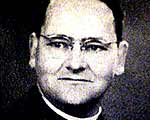 |
| Father Burke, 1951 |
Cobb wrote that Burke told him: "How long has this happened? About four years--in his room. We always watch train videos. Yes, there has been some sexual contact in my room. Last sexual contact, three weeks ago, in his [James'] room."
Burke also told Cobb that he knew about Connor's sexual misconduct with both victims. "He told me that [John and James] had confided in him that Charlie Connor had in fact been touching them sexually for some time."
Cobb, in a sworn deposition, said that he went upstairs to the provincial's office and told a top assistant to Smolich, "We got a problem."
No one at Sacred Heart notified authorities about Burke's statement.
The Jesuits have no obligation under California law to disclose the information, said Gaspari, the Jesuits' lawyer. "We are not mandated reporters because these two individuals are not minors."
Nor did anyone attempt to inform guardians of the two victims. Within hours, Cobb drove Burke to the Jesuit community at Santa Clara University, where he lives today.
Cleric Sentenced in Molestations
In addition to implicating Connor, Cobb's memo led sheriff's detectives to look at Burke as a possible suspect.
On July 11, 2000, Sgt. Lawrence Goodman and Camarda went to Sacred Heart to interview Burke. A receptionist told them that Burke was seriously ill and staying with family for an indefinite time, according to a sheriff's report.
 |
Burke at deposition |
At that time, Goodman and Camarda said, they decided to seek a warrant for Connor's arrest and did not pursue Burke any further due to a lack of evidence.
The Jesuits have no record of Burke becoming seriously ill or taking a sick leave after he was transferred to the Jesuit residence. Smolich said no deliberate attempt was made to hide Burke from authorities.
On Jan. 17, 2001, Connor pleaded no contest to one felony count of committing lewd acts on a dependent adult. He was sentenced to wear an electronic monitoring device for six months, ordered to register as a lifetime sex offender and forbidden to have any contact with mentally disabled adults or minors. Connor completed his sentence Nov. 1 and is living at a Jesuit residence in the San Francisco Bay Area.
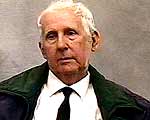 |
| Connor at deposition |
The prosecutor and investigators said they were satisfied with the outcome because it is difficult in sex cases involving mentally disabled victims to secure a conviction in a jury trial.
'How can an old priest in Boston get nine years for touching a boy in a swimming pool and Connor get no jail time for molesting his victims for years?' Holly Ilse, John's court-appointed guardian in the lawsuit |
The sentence infuriated Ilse, John's court-appointed guardian in the lawsuit.
"How can an old priest in Boston get nine years for touching a boy in a swimming pool and Connor get no jail time for molesting his victims for years?" Ilse asked. She was referring to the sentence in January given to Father John J. Geoghan Jr., 66, who also is accused of molesting more than 130 children over three decades.
| A Sister's Anguish Debra Sullivan, sister of James, one of the victims, said she was devastated when she learned about Father Edward Thomas Burke's admission of sexual misconduct with her brother. She and James had become close to Burke. "It's such a terrible, terrible betrayal," she said. "This is so horrendous, so evil and so corrupt." {Photo of Sullivan by Robert Durrell / Los Angeles Times. These photographs and captions appeared in the continuation of the article in the paper edition, page A35} |
Within weeks of Connor's sentencing, Ilse and James' sister, Debra Sullivan, hired three San Jose lawyers to file a civil lawsuit on behalf of the victims. The attorneys began gathering information and obtained the Cobb memo from the Jesuits.
Disclosures a Shock to James' Sister
Sullivan said she was devastated when she learned about Burke's admission of sexual misconduct with her brother. She and James had become close to Burke, taking him on out-of-town trips and drives in the country to see old barns. Sullivan said Burke spent hours and hours in her brother's room watching train videos with him.
"It's just a terrible, terrible betrayal," she said. "This is so horrendous, so evil and so corrupt."
Smolich said he regrets that Sullivan was never informed by Jesuits. "What happened to [James] shouldn't have happened. It wasn't fair to [James]. It wasn't fair to Debra. We are doing what we can to make it right."
Sullivan said she reluctantly held off filing a criminal complaint against Burke until the civil lawsuit is resolved on the advice of her attorney. "I want to see Burke in jail," she said.
A short time after learning about the Cobb memo, Sullivan said, she sat down with her brother to discuss the molestations. According to Sullivan's sworn deposition, James identified six Jesuits at Sacred Heart who sexually abused him: Burke, Connor, two other brothers named in the lawsuit, a "Brother Moniz" and a man named "Angel."
Sullivan said she recognized four of the names from her frequent visits to Sacred Heart over the past two decades. But she had never heard of Moniz or anyone named "Angel."
Others Registered as Sex Offenders
Brother John Rodrigues Moniz, 80, and Father Angel Mariano, 46, are registered sex offenders who were convicted of felony sex crimes with minors. Both lived at Sacred Heart in recent years. Neither man has been accused in criminal or civil courts of molesting John or James.
Moniz was convicted in 1995 after pleading no contest to one felony count of lewd conduct with a minor for fondling a 7-year-old girl in Los Gatos. He was placed on three years' probation, ordered to have no contact with children and required to pay his victim's uninsured medical expenses and psychological treatment. He now lives at Vianney Renewal Center in Dittmer, Mo., a facility that treats sex offenders run by Paraclete priests.
Mariano was arrested about midnight Sept. 21, 1998, in Campbell, Calif., near San Jose when a police officer caught him in a sex act with a 17-year-old student in a parked car. According to police reports, Mariano arranged to meet two teenagers by posing as a 25-year-old woman on an Internet chat room. He wore lipstick and rouge when he met the boys.
Mariano was convicted March 16, 1999, on two felony counts of oral copulation with a minor and spent about five months in Santa Clara County Jail. At the time of his arrest, Mariano served as an associate pastor for four years at Most Holy Trinity Church in San Jose, one of 13 parishes that are staffed by Jesuits within the province.
Mariano was removed without any explanation. Asked why parishioners at Holy Trinity were not made aware of the reasons for Mariano's departure, Smolich said: "Why should they? This is an Internet cruising thing. This is anonymous sex. This doesn't involve people at the parish. It wasn't a priest thing. He wasn't dressed in a collar."
Before he was ordained, Mariano taught at Bellarmine from 1988 to 1991. Since his arrest, Mariano lived at Sacred Heart off and on for about four months.
The presence of two mentally disabled victims of sexual abuse at Sacred Heart was "never a consideration" when Mariano was assigned to live there, Smolich said. "He needed a place to come back to. The issues around Father Mariano's situation have nothing to do with mentally disabled adults," he said.
Mariano had virtually no contact of any kind with either victim at Sacred Heart, Smolich said.
Mariano is living under the supervision of Smolich and his top assistant, Father Tony Sholander, at their residence near Santa Clara University.
"Clearly, his opportunities for ministry in the future are circumspect at best," Smolich said. "I'm not going to assign him somewhere where he has any contact with minors. I can't and I won't."
The fourth registered sex offender, Father James Thomas Monaghan, was convicted in 1992 of felony lewd conduct for fondling a 7-year-old girl who was brought to him for counseling while he was pastor of St. Ignatius parish in Sacramento. Monaghan, 87, is now in the infirmary at Sacred Heart.
Because Jesuits are required take a vow of poverty, they are not forced out of the ministry when they encounter legal problems, Smolich said. Recently, Cardinal Roger M. Mahony of the Los Angeles Archdiocese dismissed about a half dozen priests who previously had engaged in sexual misconduct.
"Diocesan priests have retirement accounts," Smolich said. "They can leave and take care of themselves. Men who have spent their lives in the Jesuit order have nothing. We are not in a position to throw them out. I wouldn't do it."
Times researcher Nona Yates contributed to this report.
Any original material on these pages is copyright © BishopAccountability.org 2004. Reproduce freely with attribution.